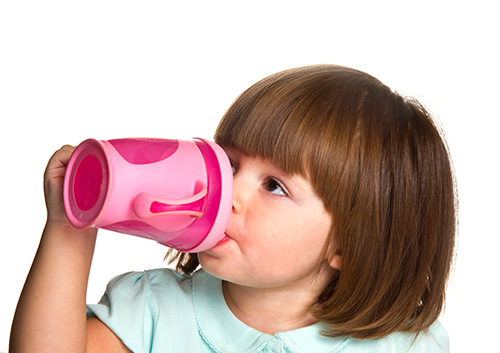Using Sippy Cups Successfully
November 23rd, 2022

Congratulations! Your child is beginning to leave her bottle behind and has started to use her first sippy cup. And the best training cup is one that makes the transition from bottle to cup an efficient, timely, and healthy one.
The Right Training Cup
While a “no spill” cup seems like the perfect choice for toddler and parent alike, those cups are designed much like baby bottles. The same valve in the no-spill top that keeps the liquid from spilling requires your child to suck rather than sip to get a drink. If your child’s cup has a top with a spout, she will learn to sip from it. Two handles and a weighted base make spills less likely.
When to Use a Training Cup
Children can be introduced to a sippy cup before they are one year old, and we suggest phasing out the bottle between the ages of 12 and 24 months. Use a sippy cup as the source for all liquids at that age, and only when your child is thirsty and at mealtime to avoid overdrinking. The transition from sippy cup to regular cup should be a swift one.
Healthy Sipping Habits
The best first option in a sippy cup between meals is water. Milk or juice should be offered at mealtimes, when saliva production increases and helps neutralize the effects of these drinks on young teeth. And don’t let your child go to sleep with anything other than water—falling asleep with a cup filled with milk, juice, or other sugary drinks means these liquids stay in the mouth overnight. Finally, while a sippy cup is convenient and portable, don’t let your young child walk and sip at the same time to avoid injuries.
When your child comes to our Hiawatha, IA office for her first visit, please bring any questions you might have about training cups. We would be glad to share ways to make the move from bottle to cup both successful and safe!




